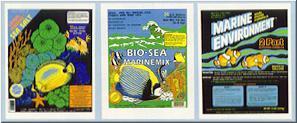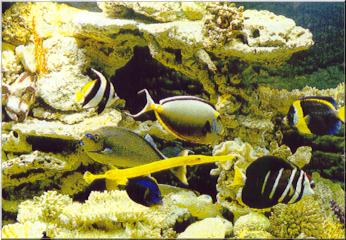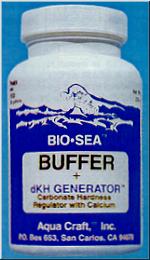Periodically self proclaimed aqua-gurus provide false information regarding marine aquarium products. The latest bogus information attacks some marine salts and the elements phosphorus/phosphate and borate.
There are two forms of phosphate: a) inorganic b) organic. Unfortunately, the majority of aquarium hobbyists kits marketed for testing phosphate cannot discern between inorganic and organic forms of phosphate. Inorganic phosphate “could” be added to a synthetic seawater formulation. If that ‘working solution’ was destined only for use in a closed re-circulating system (salt water aquarium) that housed certain specific specimens that required some select form or forms of phosphate, or in an aquarium that was suffering from under lighting. Inorganic phosphate can be added to a synthetic sea water preparation that is used in an aquarium that is under-lit. Phosphate foments the growth of some algae. In a marine aquarium that is properly lit, the inclusion of phosphate will result in hair algae, “plating” and/or “ring around the tank” with heavy deep green alga. In most marine aquatic applications, this is undesirable.
Regular water changes will reduce the buildup of waste ions and replenish major, minor and trace elements that are consumed by the metabolic intake of animals on display. Some elements are also depleted by the activity of a biological filter, chemical filtration and/or protein skimming. It is essential to use a marine salt that is formulated without phosphates. A quality marine salt will contain all elements found in natural sea water (NSW), at levels comparable found in nature. Many marine salts claim to contain all elements or dozens of trace elements found in seawater. The fact is that most marine salts are basic mixtures of major or bulk salts. Some add a few low cost minor ions. Most rely on impurities as a form of ‘trace elements’ to make their packaging and advertising claims, colorable. These trace impurities are described as ‘ions in a free form’, and do not stay in solution. There are several forms in which borate can be added to a synthetic seawater formulation. Some forms are: sodium borate and boric acid. or 20, 180 tons per cu. mile. Borate can be used in marine salts to assist in pH control and to a degree pH stabilization. Borate was added to early synthetic seawater formulations. It is still used in some brands of marine salts.
Qualified researchers and knowledgeable marine aquarists understand the many benefits of the superior approach to pH stabilization and control. They understand this is best accomplished by utilizing various forms of carbonates. E.G. Today’s pH buffering platform. This eliminates possible borate related problems, in the closed marine aquarium. The S-15™ Report™ indicates that many brands of marine salts contain similar or significantly higher amounts of borate Vs. natural seawater. In order of concentration BIO-SEA® contains 0.23 ppm. Coral Marine™ (1) contains 0.23 ppm. Marine Environment® contains 0.24 ppm. Tropic Marin® has 4.21 ppm. Forty Fathoms®/Crystal Sea™ has 5.88 ppm. Instant Ocean® has 6.05 ppm. Reef Crystals® has 7.44 ppm. Kent Marine™ (1) has 7.44 ppm. and Coralife® has 9.45 ppm. of B (Borate or Boron). There are several brands of powdered “buffers” offered to reef and marine fish keepers. One brand (SeaChem™) contains tetra-sodium borate (borax like hand cleaner). This is evidenced by packaging claims and varying amounts of bead like ingredients in the product. (1) Tested separately from the S-15™ Report™. |


